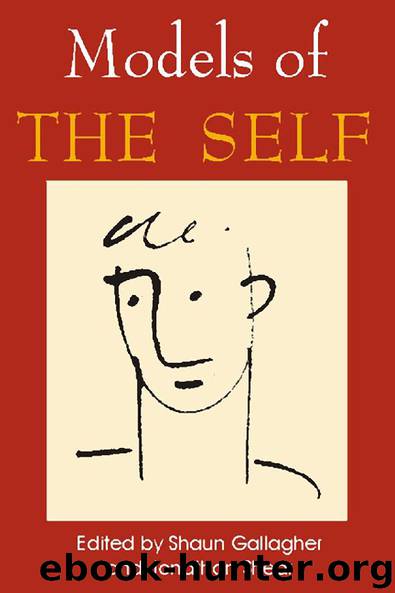Models of the Self by Shaun Gallagher

Author:Shaun Gallagher
Language: eng
Format: epub
Tags: Human nature, self, self-knowledge, ethics, brain, cognitive science, embodiment, spirituality, philosophy, neuropsychology, self-consciousness, psychology, mysticism, personhood, neurology, qualia, evolution, self-function, dynamical systems theory, phenomenology, agency, self-awareness, selfhood, schizophrenia, pathology, Buddhism, subjectivity
ISBN: 9781845407223
Publisher: Andrews UK Limited 2013
Published: 2013-10-22T00:00:00+00:00
If a higher-order representation theory is to explain phenomenal consciousness, it has to explain the unique first-personal manifestation of our conscious states, but this is exactly what it fails to do.
Thus, it is highly questionable whether one can account for the unique first-personal givenness of consciousness by sticking to a traditional model of object-consciousness and then simply replacing the external object with an internal one. In fact, when one is non-introspectively conscious of one’s thoughts, feelings, beliefs and desires, one is not given to oneself as an object at all. And this is exactly what Rosenthal overlooks.
More generally, there is reason to warn against taking phenomenal consciousness as a relational property, be it a relation between two acts or a relation between the mental state and itself (cf. Henrich, 1966; 1970; Cramer, 1974; Pothast, 1971). Every relation entails a distinction between two (or more) relata, and it is doubtful whether one could account for the immediacy, unity and infallibility of self-awareness (particularly its so-called immunity to the error of misidentification ), if it were in any way a mediated process. As a result, the first-personal givenness of an experience cannot come about as the result of a self-identification, a reflection, an inner vision or introspection, nor should it be conceived as a type of intentionality or as a conceptually mediated propositional attitude, all of which entails the distinction between two or more relata. The basic self-awareness of an experience is not mediated by any foreign elements such as concepts and classificatory criteria. It is an immediate and intrinsic self-acquaintance which is characterized by being completely irrelational. [8]
We consequently have to choose the second of the following two theories:
(1) Consciousness is strictly and exclusively conscious of the intentional object. There is no simultaneous self-awareness. Thus the act itself is unconscious, but it can be made conscious through a subsequent, higher-order intentional act, which takes the first act as its object. In this way consciousness can be compared to a knife, which is able to cut other things, but not itself.
(2) Consciousness is self-luminous. It is characterized by intentionality, but being intentionally aware of objects, it is simultaneously self-aware through and in itself. Its self-awareness is not due to a secondary act or reflex but is a constitutive moment of the experience itself, and consciousness can consequently be compared to a flame, which illuminates other things, and itself as well (Kern, 1989, pp. 51–3; Henry, 1963, p. 173).
The criticism directed at the higher-order thought theory has not been meant to imply that reflective self-awareness and objectifying self-thematization is impossible, but merely that it always presupposes a prior unthematic and pre-reflective self-awareness as its condition of possibility. Thus, it is necessary to distinguish pre-reflective self-awareness—which is an immediate, implicit and irrelational, non-objectifying, non-conceptual and non-propositional self-acquaintance—from reflective self-awareness—which, at least in certain forms, is an explicit, conceptual and objectifying thematization of consciousness. Rosenthal’s higher-order thought theory might at most throw light upon explicit self-experience, but not upon the origin of self-awareness as such.
Our acts are pre-reflectively self-aware, but they are also accessible for reflection.
Download
This site does not store any files on its server. We only index and link to content provided by other sites. Please contact the content providers to delete copyright contents if any and email us, we'll remove relevant links or contents immediately.
The Art of Thinking Clearly by Rolf Dobelli(8839)
Mindhunter: Inside the FBI's Elite Serial Crime Unit by John E. Douglas & Mark Olshaker(7833)
Change Your Questions, Change Your Life by Marilee Adams(6639)
Nudge - Improving Decisions about Health, Wealth, and Happiness by Thaler Sunstein(6633)
Mastermind: How to Think Like Sherlock Holmes by Maria Konnikova(6233)
The Power of Now: A Guide to Spiritual Enlightenment by Eckhart Tolle(4751)
Men In Love by Nancy Friday(4319)
Factfulness: Ten Reasons We're Wrong About the World – and Why Things Are Better Than You Think by Hans Rosling(4020)
The Confidence Code by Katty Kay(3566)
Thinking in Bets by Annie Duke(3530)
Man and His Symbols by Carl Gustav Jung(3314)
Three Women by Lisa Taddeo(2918)
The Worm at the Core by Sheldon Solomon(2916)
Why Buddhism is True by Robert Wright(2825)
Liar's Poker by Michael Lewis(2809)
The Inner Life of Animals by Peter Wohlleben(2765)
Descartes' Error by Antonio Damasio(2731)
The Power of Mindful Learning by Ellen J. Langer(2709)
The Slow Fix: Solve Problems, Work Smarter, and Live Better In a World Addicted to Speed by Carl Honore(2574)
